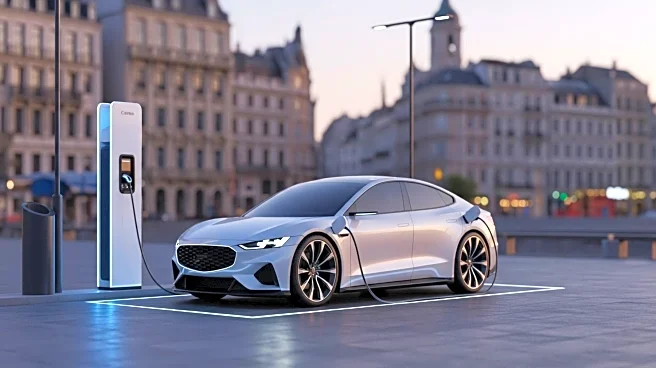What's Happening?
BYD has outsold Tesla in the European market for the second consecutive month, according to data from the European Automobile Manufacturers Association (ACEA). In August, BYD's sales increased significantly, capturing a larger market share compared to Tesla, whose sales declined by 36.6%. This shift highlights the growing presence of Chinese automakers in Europe, leveraging competitive pricing and innovative technology. Despite Tesla's established factory in Germany, BYD's aggressive promotion and strategic vehicle offerings have enabled it to gain ground. The overall market for electric vehicles in Europe is expanding, with battery electric and plug-in hybrid cars accounting for a significant portion of new car sales.
Why It's Important?
The rise of BYD in the European market signifies a shift in the competitive landscape for electric vehicles, challenging established players like Tesla. This development could impact Tesla's market strategy and influence the dynamics of the EV industry in Europe. The increased presence of Chinese automakers may lead to intensified competition, potentially driving innovation and price adjustments. For consumers, this could mean more options and potentially lower prices for electric vehicles. Additionally, the growth in EV sales aligns with Europe's environmental goals, promoting cleaner transportation alternatives.
What's Next?
As BYD continues to expand its presence, Tesla may need to reassess its strategies to maintain its market position in Europe. This could involve enhancing its product offerings or adjusting pricing strategies to compete effectively. The ongoing competition may also prompt other automakers to innovate and improve their electric vehicle technologies. Regulatory changes in Europe regarding emissions and import tariffs could further influence market dynamics, affecting how automakers strategize their operations and product lines.
Beyond the Headlines
The competition between BYD and Tesla in Europe underscores broader trends in the global automotive industry, including the rise of Chinese manufacturers and the shift towards sustainable transportation. This could lead to long-term changes in manufacturing practices and international trade policies. The focus on plug-in hybrids and battery electric vehicles reflects a growing consumer demand for environmentally friendly options, potentially influencing future regulatory frameworks and industry standards.








